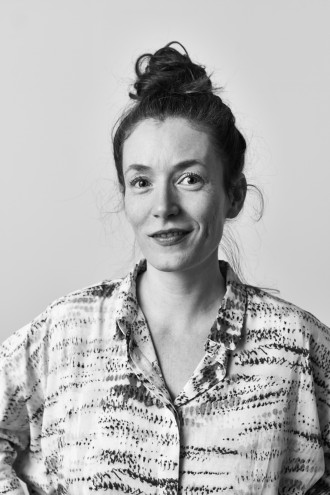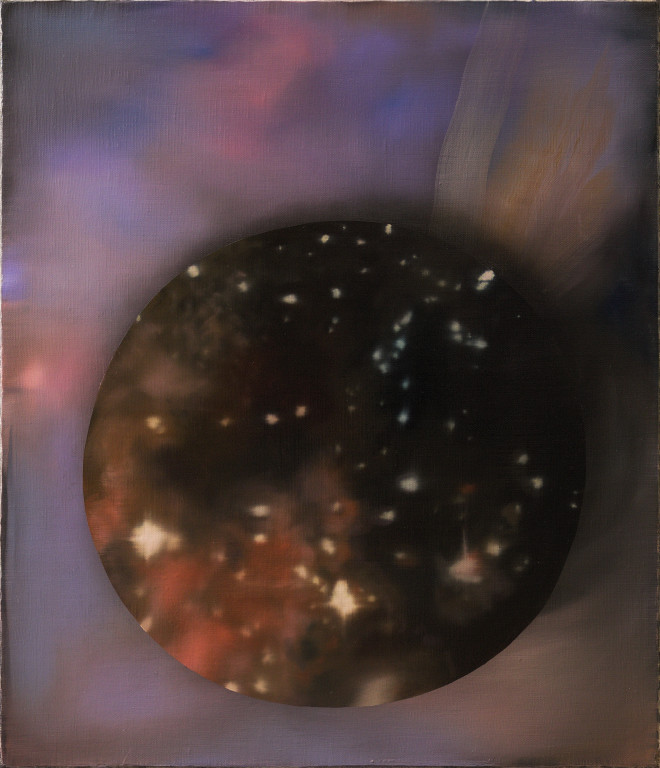Grit Richter at ART DEMO DAY
Cologne
Grit Richter’s paintings hover between the abstract and the figurative, and can be as versatile as the themes they touch on: our feelings and thoughts.
Richter studied at the Academy of Fine Arts in Dresden for two years before relocating to Hamburg to continue her studies. In 2007, she graduated from the class taught by German contemporary artist Norbert Schwontkowski. With his eye for absurdity and his talent dor capture it in his works, he was a great source of inspiration for Richter.

Florian Waldvogel, the curator of the first ART DEMO DAY, interviewed seven participating artists. From today on, we present a new interview each day.
Florian Waldvogel: What were your most formative experiences during your studies?
Grit Richter: The inspiring and sobering encounters with teachers, the many ‚aha‘ moments, and the stamina and ambitions you quickly develop when you study.
FW: How are social references important for you?
GR: From a sociological point of view, society is a group of people living together. From a constitutional point of view, it is people co-existing in a liberal state. As a person and artist, I am part of society and interested in political, global and local occurrences. As I don’t differentiate between my personal life and my life as an artist, my interests inevitably influence my work. But the sociological aspect is always the main focus. I am trying to express the complexity and perception of inner processes like emotions, memories and the unconscious. With abstract forms, I want to create artistic similes of these processes. Through the transformation into abstract form, I want to show the collective essence of such individual emotionals and mental processes. Starting from the similarities in perception and emotional processes as well as from collective memories, I try to find connotations that give form to something impalpable.
FW: What is your definition of an exhibition?
GR: An exhibition is a space, an occurrence or a constitution where things like art, toys, artefacts, witnesses of a time period, and actually everything is made accessible for an interested public. Mostly the things on display are presented in a curated context.
FW: Can abstract painting be political?
GR: It’s difficult to define the term political. I start from my personal understanding of the term that refers to its sociological aspect. So political for me means facing problems of society and expressing it in my art. So yes, abstract art can be political if loaded with content that therefore goes beyond the formal and conceptual.
FW: Do you feel an urge to be political?
GR: It is not at all my intention to create political art, but in the end I do so as I thematise topics that touch us individually and as a society and that trigger reflection. Maybe it’s an unconscious urge to be political. As a private person, I am certainly interested in topics about our society but I am not thinking about them in a constitutional way. I would rather think about them in a global way – focussing on us, the human beings. I think this is what motivates me as an artist: the analysis of human beings who co-exist within unspecified societies, conflicts and emotions.
Read the interview in German / Zum Interview auf Deutsch

Archive
- Dezember 2016 (1)
- Oktober 2016 (3)
- September 2016 (24)
- Juli 2016 (20)
- Juni 2016 (24)
- Mai 2016 (18)
- April 2016 (18)
- März 2016 (21)
- Februar 2016 (11)
- Januar 2016 (20)
- Dezember 2015 (20)
- November 2015 (37)
- Oktober 2015 (30)
- September 2015 (24)
- August 2015 (4)
- Juli 2015 (30)
- Juni 2015 (9)
- Mai 2015 (17)
- April 2015 (23)
- März 2015 (18)
- Januar 2015 (8)
- Dezember 2014 (1)
- November 2014 (3)
- Oktober 2014 (10)
- September 2014 (4)
- August 2014 (2)
- Juli 2014 (3)
- Juni 2014 (2)
- Mai 2014 (5)
- April 2014 (11)
- März 2014 (12)
- Februar 2014 (13)
- Januar 2014 (10)
- Dezember 2013 (5)
- November 2013 (13)
- Oktober 2013 (24)
- September 2013 (18)
- August 2013 (26)
- Juli 2013 (13)
- Juni 2013 (35)
- Mai 2013 (44)
- April 2013 (49)
- März 2013 (61)
- Februar 2013 (54)
- Januar 2013 (46)
- Dezember 2012 (50)
- November 2012 (58)
- Oktober 2012 (62)
- September 2012 (61)
- August 2012 (63)
- Juli 2012 (64)
- Juni 2012 (61)
- Mai 2012 (63)
- April 2012 (51)
- März 2012 (67)
- Februar 2012 (37)



